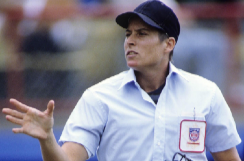Gil's Call: This is based on the premise—also in use by sports officials—that objectivity & following the rules as written are more ethical and reliable activities than discretion, subjectivity, and "winging it." That's why many an explanation from an umpire or referee to a coach or player begins with "by rule." When something is objective, it carries more weight—realistically and legally too—than when subjectivity is involved and goalposts may be moved without warning.
With Hernandez's prima facie case made (protected class, adverse employment decision, non-protected favored despite stats to contrary), MLB has the burden to respond to why Hernandez hasn't been promoted/assigned.
As Hernandez's team stated when it first filed this suit in 2017, objective reports and performance metrics indicated that Hernandez was an above-average umpire comparable or better than other, "less qualified" white umpires who received promotion/assignments to crew chief and World Series.
Related Post: Angel Hernandez Sues MLB for Racial Discrimination (7/3/17).
By admitting in the following depositions that its process is subjective—and that Hernandez performed well during the relevant period—MLB's difficulty now lies in defending its decisions not to promote Hernandez to crew chief or assign him to the World Series despite favorable evaluations while awarding positions to non-protected class (white) umpires who may not have been more than or equally qualified for the job or, as Hernandez originally alleged, were "less qualified."
Attorneys and name partners Kevin L. Murphy of Murphy Landen Jones PLLC and Paul Z. Lewis/Nicholas J. Zaita of Lewis Dibiasi Zaita & Higgins represent Hernandez in his lawsuit (they're also representing Joe West in his lawsuit against Paul Lo Duca).
In August, Hernandez submitted his first Amended Complaint.
 |
| Hernandez's suit analyzed WS umpire races. |
MLB is Deposed
During MLB Senior Director of Umpire Operations Matt McKendry, Senior Vice President of Baseball Operations Peter Woodfork, Chief Baseball Officer Joe Torre, and MLB Commissioner Rob Manfred's depositions over the summer, the witnesses purportedly stated on multiple occasions that objective documents such as statistics and evaluation reports did not rule the day on promotion/assignment decisions.
Related Post: Court Orders Angel Hernandez to Undergo Psych Exam (8/28/19).
 |
| Manfred gives final approval for all selections. |
McKendry said in his deposition that "the decisions made on crew chief assignments are done outside of any individual evaluation process" while Woodfork said, "I do not look at game evaluations" in response to the question, "Do you take the collective amount of the game evaluations in to your consideration when promoting an umpire to crew chief?"
Meanwhile, Torre said he looked at mid-year and year-end evaluations—not game reports—and agreed that based on an overall set of evaluative comments for a sample season during the relevant period, Hernandez had a good year.
MLB Admits Subjectivity, After Which Hernandez Amended His Complaint
 |
| Woodfork's deposition precedes AH's leave. |
Based on this and other "new" evidence, Hernandez amended his complaint based on allegations that key decision-makers Woodfork and Torre (who answer to Manfred) admitted the promotion/assignment process includes criteria "outside the merits of an umpire's performance" to include "overwhelmingly...subjective criteria" including non-objective opinions.
Hernandez's team allege that the promotion/selection processes thus are "based largely, if not entirely, on subjective criteria and the opinions of Major League Baseball's umpire executives who are involved in making those decisions."
 |
| Hernandez's suit fairly resembles Postema's. |
Postema and the league settled the lawsuit out of court, which itself recalled umpire Bernice Gera's successful 1971 lawsuit against the National Association of Baseball Leagues. Meanwhile, Theresa Cox-Fairlady similarly sued baseball—for harassment—and similarly settled out of court.
As Postema wrote in her memoir, "Don't give me that line, 'Baseball is America's game.' To me, baseball is the exact opposite of what America stands for."
Hernandez alleges that MLB's selection process resulted in a disparate impact in which no minority umpires were promoted to crew chief since 2011 (the beginning of the relevant period) while at least 10 non-Latino white umpires have been promoted to crew chief position in that timeframe.
Manfred previously stated that MLB must improve its minority hiring.
Hernandez has claimed damages and injuries including loss of earnings/earning capacity, loss of career opportunities, mental anguish (hence the reason the court ordered a psychological examination), physical and emotional distress, humiliation and embarrassment, and loss of professional reputation.
Former MiLB Umpire and Sports Lawyer Brandon Leopoldus joins The Plate Meeting Podcast to discuss the ramifications of Hernandez's lawsuit in the video as follows:
Alternate Link: By Rule Analysis of Angel Hernandez's Amended Complaint (CCS)











0 comments :
Post a Comment